Too dear summaryOverview of Leo Tolstoy and His Works:Famous Russian author Leo Tolstoy lived from 1828 until 1910. He is regarded as one of the greatest authors in literary history and is noted for his realistic and philosophical writings. His novels, novellas, short tales, and essays tackled themes like love, war, spirituality, and social justice. Three of his most well-known works are "War and Peace," "Anna Karenina," and "The Death of Ivan Ilyich." Leo Tolstoy - The Life and Legacy of a Literary Giant:The writings of the prolific author Leo Tolstoy have had a lasting impact on philosophy and literature. Despite being raised in a noble Russian household, Tolstoy underwent a theological and philosophical awakening later in life that profoundly impacted his writing. His writings are renowned for their accurate portrayals of human nature and society and his investigation of challenging ethical and philosophical issues. Despite his enormous literary accomplishment, Tolstoy battled with internal and spiritual difficulties throughout his life. Although he passed away, his reputation as a literary giant lives on, and his works are still praised and read widely today. 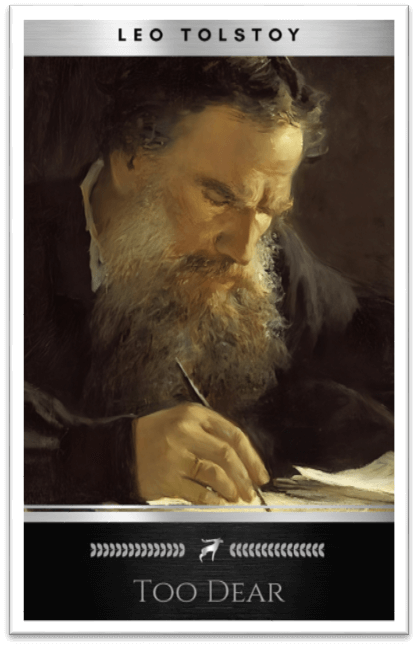
Exploring the Perils of Materialism in Tolstoy's Too Dear:The short novella "Too Dear" by Leo Tolstoy is a potent attack against materialism and the perils of pursuing wealth at any cost. Ivan, a man who grows sentimental about his farm and sells it to wealthy businessman Brekhunov, is the main character in the novel. Ivan becomes fixated on purchasing it back, but Brekhunov offers to sell it to him again at a much greater price. To buy the land, he takes out a loan from a usurer, but he needs help to repay it and ends himself in serious debt. Finally, he is compelled to sell his land once more after realizing that the price he paid for his devotion to it was not worthwhile. Tolstoy examines the perils of materialism and its effects on people and society as a whole through the figure of Ivan. The narrative emphasizes the negative impacts of avarice and the disastrous results of usury, which contribute to Ivan's financial ruin. Overall, "Too Dear" serves as a potent reminder of the dangers of materialism and the necessity of finding fulfilment in things like family, community, and inner peace that count. A Synopsis of Tolstoy's Too Dear:In the short novella "Too Dear" by Leo Tolstoy, a man named Ivan and a prosperous businessman named Brekhunov are the main characters. Ivan decides to sell his land to Brekhunov after growing sentimental about it. However, Ivan becomes fixated on the thought of repurchasing it when Brekhunov offers to sell it back to him at a far higher price. To pay for the land, Ivan takes out a loan from a usurer, but he needs help to repay it and ends up in serious debt. Realizing that his devotion to the land was not worth the expense, he is compelled to sell it again. Themes like materialism and greed, as well as the effects they can have on people and society, are explored by Tolstoy throughout the narrative. 
Ivan and Brekhunov are the story's major protagonists. Ivan is a man who develops a strong attachment to his land and is prepared to go to extreme lengths to get it back. Rich businessman Brekhunov initially buys the land from Ivan and then offers to sell it back to him at a much greater price. The usurer is also a key character because of the loan he provided and the excessive interest rates he charged, which led to Ivan's financial collapse. Overall, "Too Dear" warns against materialism and the value of finding fulfilment in the things that count in life. The Themes and Message of Tolstoy's Too Dear:The short story "Too Dear" by Tolstoy covers topics of materialism and greed and the effects they can have on people individually and collectively. Ivan serves as a metaphor for the story's themes of the perils of attachment to worldly goods and the repercussions of pursuing wealth at any cost. The dangers of materialism are one of the story's main themes. Ivan has a strong attachment to his land and would do anything to get it back, even if it means taking on debt and running the risk of financial catastrophe. His love for the countryside turns into an obsession, which ultimately brings about his demise. 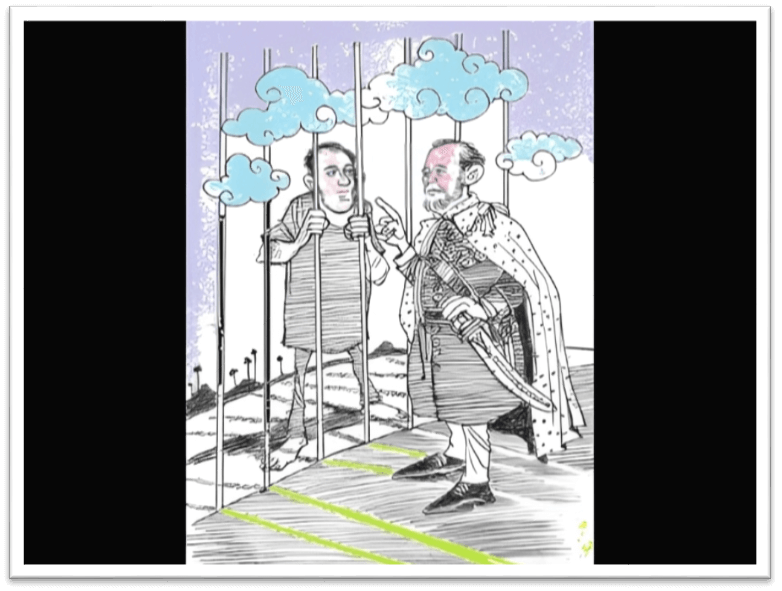
The effects of greed on people and society are a different subject in the narrative. Ivan is taken advantage of by Brekhunov because of his avarice, who first pays Ivan a low price for his land before selling it back to him for a much greater price. Ivan borrows money from a usurer at excessive interest rates due to his avarice and devotion to the land, which finally causes him to go bankrupt. The tale also criticizes usury and its detrimental effects on people and society. Ivan's financial collapse results from the usurer's loan and exorbitant interest rates, underscoring the perils of this activity. Overall, the message of "Too Dear" warns against the perils of materialism and greed. The story encourages readers to find fulfilment in things that truly matter, such as family, community, and inner peace, rather than becoming attached to material possessions and pursuing wealth at any cost. The Dangers of Materialism and the High Cost of Pursuing Wealth in Too Dear:The short novella "Too Dear" by Tolstoy is a potent indictment of materialism and the detrimental effects of pursuing wealth at any cost. Ivan, the main character in the narrative, grows sentimental about his farm and decides to sell it to a successful businessman named Brekhunov. Ivan becomes fixated on buying it back after Brekhunov offers to sell it to him again for a far greater price. 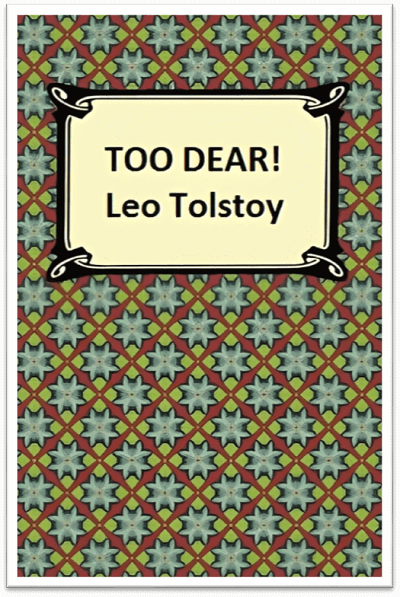
Ivan becomes fixated on the land to the point where he borrows money from a usurer to pay a high price. He cannot repay the loan and sinks further into debt, which causes him to lose everything. Finally, he is compelled to sell his estate once more after realizing that the cost of his attachment is not worth it. Ivan serves as a vehicle for Tolstoy to illustrate the perils of materialism and the high price of pursuing wealth at any cost. Ivan's infatuation with his property drives him to make bad financial choices, which finally cause him to fail. The tale also criticizes usury and its detrimental effects on people and society. Ivan's financial collapse results from the usurer's loan and exorbitant interest rates, underscoring the perils of this activity. Overall, "Too Dear" is a potent warning against materialism and emphasizes the value of finding fulfilment in things like family, community, and inner serenity. The narrative implores readers to be aware of the costly price of pursuing wealth at all costs and to find contentment in things that matter. Tolstoy's Presentation of the Theme of Materialism Through the Character of Ivan in Too Dear:Ivan, a character in Tolstoy's short novella "Too Dear," and his ties to his land serve as a vehicle for the issue of materialism. Ivan has a strong attachment to his land and would do anything to get it back, even if it means taking on debt and running the risk of financial catastrophe. His love for the countryside turns into an obsession, which ultimately brings about his demise. Tolstoy portrays Ivan's devotion to his land as a manifestation of materialism. Ivan's fixation with the land and desire to buy it is motivated more by a sense of ownership and possession than by a real love of the land. This hazardous connection to material items is shown to be the cause of Ivan's bad financial judgment and eventual financial disaster. 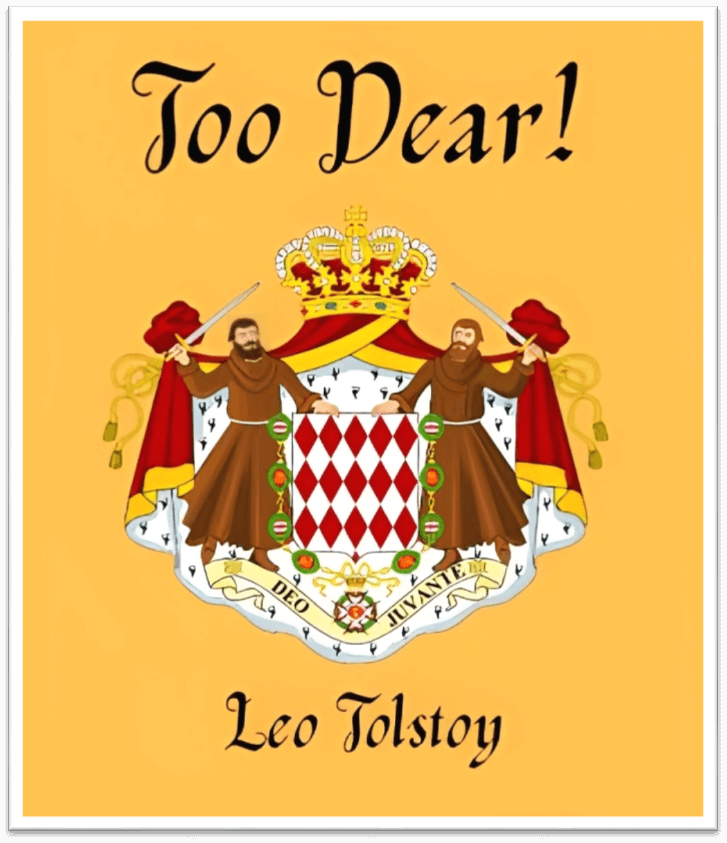
Ivan serves as a vehicle for Tolstoy to illustrate the perils of materialism and the terrible price of getting overly dependent on worldly stuff. Ivan's infatuation with the property drives him to make bad financial choices, ultimately ruining him. Tolstoy proposes alternatives to Ivan's commitment to material possessions, such as family, community, and spiritual calm. The pursuit of material goods, ultimately meaningless and unsatisfying, is contrasted with these ideals, which are demonstrated to be more gratifying. Tolstoy offers a potent critique of materialism and the perils of growing connected to material items overall through the character of Ivan and his commitment to his land. The narrative urges readers to pursue happiness in more meaningful pursuits, such as family, community, and inner serenity, rather than being hooked to material belongings and pursuing wealth at any cost. The Consequences of Ivan's Greed and Obsession in Too Dear:Ivan, the main character in Leo Tolstoy's short novella "Too Dear," develops a strong attachment to his land and will do anything to get it back. His love for the land turns into an obsession, which causes him to make bad financial choices and finally bring about his demise. Ivan eventually took out a high-interest loan from a usurer because of his greed and desire to reclaim his land. He becomes severely in debt and cannot repay the loan, which puts him in financial catastrophe. Even when it becomes apparent that purchasing the land back would not be financially advantageous, his devotion to it leads him to make rash judgments. Tolstoy emphasizes the destructive effects of greed and obsession via Ivan's decline. Ivan's attachment to the land causes him to lose perspective about his predicament and make foolish choices. His obsession with material items ultimately causes him to go bankrupt, underscoring the perils of becoming overly dependent on material possessions. The use of usury, which adds to Ivan's financial collapse, is also criticized in the novel. The predatory lending practices and high-interest rates of the usurer show the damaging effects that this practice can have on people and society. Overall, "Too Dear" is a strong warning story about the perils of greed and addiction. Ivan's adherence to his property causes him to make bad financial choices, which finally causes his demise. Instead of growing attracted to material stuff and pursuing wealth at any cost, the narrative advises readers to be aware of greed's harmful effects and find fulfilment in things that matter. The Tragic Consequences of Ivan's Actions in Too Dear:The terrible effects of the main character Ivan's attachment to his land and his following acts are depicted in Leo Tolstoy's short novella "Too Dear." Ivan has a strong attachment to his land and will go to tremendous lengths to get it back, which ultimately causes him to become bankrupt and lose the very thing he was most attached to. Ivan borrows money from a usurer at a high-interest rate to fund his operations because he is determined to get his land back at all costs. Ivan must listen to the usurer's warnings about the high borrowing costs since he is focused on returning his land. Ivan ends up in financial catastrophe due to being heavily in debt and unable to repay the loan. The land he was so attached to must be sold, and he loses it permanently. Ultimately, his fixation with his land and addiction to worldly belongings brought him to ruin. Tolstoy emphasizes the perils of growing overly devoted to material stuff and the results of making irrational judgments via the tragic tale of Ivan. Ivan's actions ultimately cause him to lose everything he cared about and to be financially ruinous. The narrative encourages readers to find fulfilment in things that genuinely matter and to be aware of the destructive effects of greed and obsession. The catastrophic results of chasing wealth and worldly belongings can be seen in Ivan's story in "Too Dear." 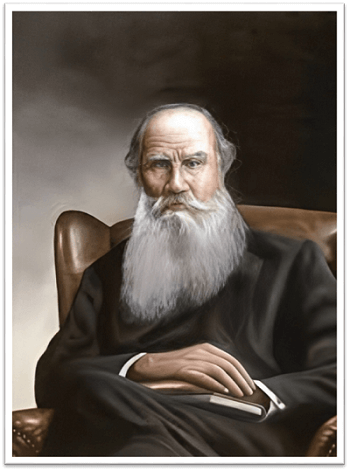
The Role of Usury and High-Interest Rates in Ivan's Financial Downfall in Too Dear:The short novella "Too Dear" by Leo Tolstoy analyses the effects of Ivan's greed and obsession while criticizing usury and exorbitant interest rates. These actions mostly cause Ivan financial difficulties throughout the novel. Ivan grows incredibly connected to his land and would do anything to get it back, even take out a high-interest loan from a usurer. Ivan is adamant about reclaiming his land and disregards the repercussions of his actions despite the usurer's cautions about the high cost of borrowing money. Ivan becomes highly indebted and unable to repay the loan due to the usurer's excessive interest rates, which causes his financial disaster. Ivan is oblivious to the issue because of his devotion to his land and needs help seeing the cost of taking out a loan from a usurer. Ivan's story serves as a vehicle for Tolstoy to illustrate the drawbacks of usury and excessive interest rates. As in Ivan's case, these behaviours prey on those in severe need of money and can result in ruinous debt. In the novel, these methods are criticized, and predatory lending techniques are highlighted as a factor in financial instability and catastrophe. In conclusion, "Too Dear" warns about the risks of getting excessively attached to worldly possessions and pursuing prosperity at any cost. The narrative also criticizes the use of usury and excessive loan rates, underlining how they contributed to Ivan's financial collapse. Instead of growing hooked on material stuff and pursuing prosperity by dishonest methods like usury, the story urges readers to be aware of the effects of their actions and to look for fulfilment in things that genuinely count. Leo Tolstoy's Criticism of Usury and its Negative Impact on Individuals and Society in Too Dear:In his short novella "Too Dear," Leo Tolstoy criticizes the usury industry and the harm it does to people and society. The novel's protagonist is Ivan, who is very connected to his land and borrows money from a usurer at a high-interest rate to get it back, ultimately ruining his finances. Tolstoy depicts the usurer as a predatory creature who prey on needy people like Ivan, who have no financial security. Ivan becomes highly indebted and unable to repay the loan due to the usurer's excessive interest rates, which causes his financial disaster. In Ivan's story, Tolstoy emphasizes the detrimental effects of usury on people and society. The cycle of debt and financial instability brought on by usury can negatively impact people and families. Additionally, the practice impacts more general economic and societal problems, including inequality and poverty. The narrative criticizes usury to exploit the weak and draws attention to the necessity for fair and just lending practices. Tolstoy urges readers to be aware of the harm that usury causes to people and society and to support fair lending practices. Last but not least, "Too Dear" critiques usury and its detrimental effects on both people and society. Tolstoy utilizes the narrative to emphasize the risks associated with predatory loan practices and the necessity for fair and reasonable lending practices. The narrative urges readers to consider their choices' effects and promote social and economic fairness. The Significance of Leo Tolstoy's Too Dear:Over a century after its publication, Leo Tolstoy's "Too Dear" is still a vital and pertinent work. The novel's moral, which criticizes materialism and the desire for wealth at any cost, is ageless and still relevant to readers today. The warning in the story about the risks of growing connected to material belongings is especially pertinent in today's society, where consumerism and the amassing of wealth are frequently considered indicators of success. The story emphasizes the significance of finding fulfilment in things that matter, like relationships, personal development, and having a beneficial impact on the world 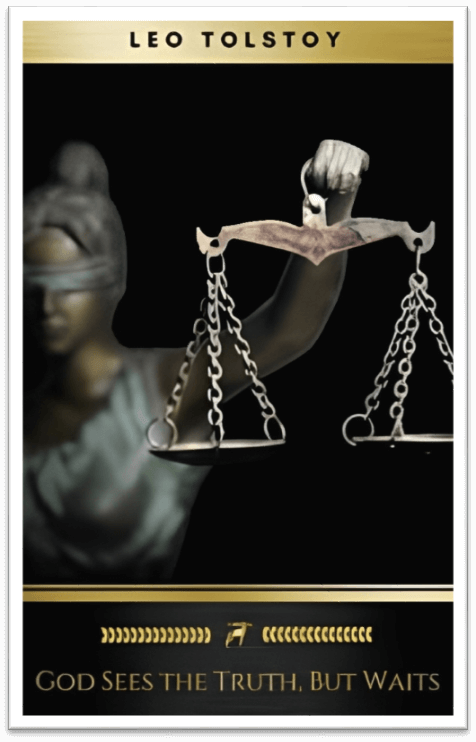
Furthermore, Tolstoy's criticism of usury and exorbitant interest rates is still a vital concern in today's culture. Predatory lending practices still target vulnerable people in many parts of the world and feed debt and financial instability cycles. The story's plea for fair and just lending practices provides a reminder of the need for more social and economic fairness. Overall, "Too Dear" is a potent and thought-provoking book that can still provide readers with relevant insights and lessons today. The narrative's moral, which warns against materialism and emphasizes the necessity of equitable and fair lending practices, is still important and relevant today. It also serves as a reminder of the worth of leading a full life based on values that matter. Conclusion:Finally, Leo Tolstoy's short story "Too Dear" potently condemns materialism, the chase of wealth at all costs, and the negative effects of usury and high-interest loan practices. The themes and ideas of the novel still strike a chord with readers today, offering crucial understandings and lessons about the necessity of greater social and economic fairness. Tolstoy emphasizes the negative effects of greed and the value of finding fulfilment in things that matter via the character of Ivan and his commitment to his property. "Too Dear" is a timeless cautionary tale that inspires readers to examine their beliefs and behaviour and work towards living a satisfying life based on fairness, compassion, and justice.
Next TopicTo the Lighthouse Summary
|
 For Videos Join Our Youtube Channel: Join Now
For Videos Join Our Youtube Channel: Join Now
Feedback
- Send your Feedback to [email protected]
Help Others, Please Share









